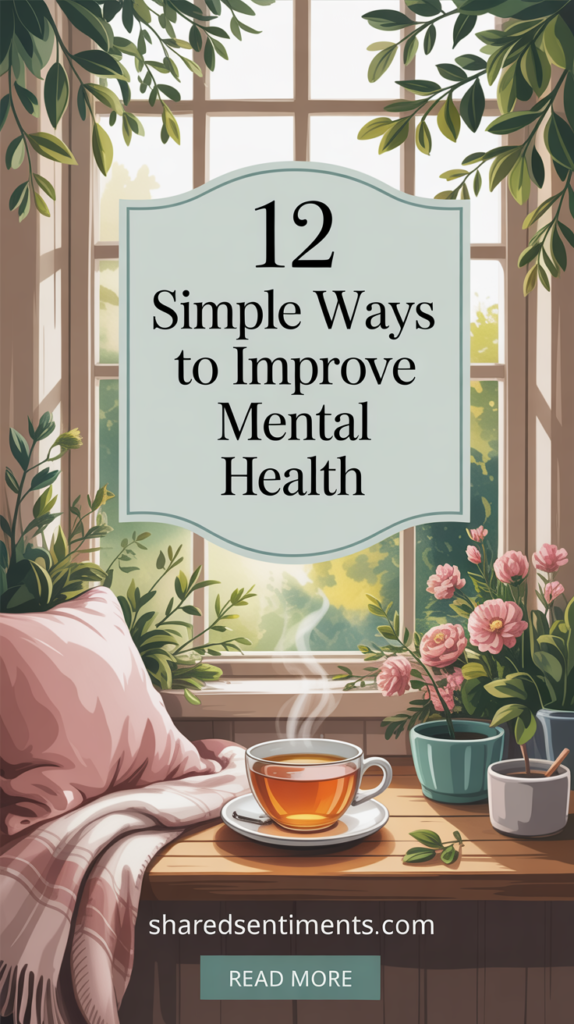12 Simple Ways I Learned to Improve Mental Health

For a long time, trying to improve mental health never even crossed my mind.
I’ve spent years trying to figure out how to feel steady and calm inside my head.
Some days, I woke up feeling heavy and stuck.
Other days, I thought I could take on anything.
Even when I lost control of my feelings and had sudden outbursts, I didn’t stop to think
about what was really happening inside me.
It took time to see the patterns and understand what helped me feel better.
That choice to ignore my mind came back to hurt me later.
People often say we don’t learn until we hit the ground, and that’s exactly what happened to me.
When I took a year off from college, I had to face the truth that my mental health needed to be my highest priority.
If you’re looking for ways to improve mental health, maybe my experiences will give you some ideas.
I’m not an expert, but I’m someone who has struggled and learned along the way.
I don’t want you to feel as lost or alone as I did.
You deserve a mind that feels safe and open, not trapped.
It’s okay to slow down, breathe, and learn from someone who has been there.
Here are ten things that made a difference for me.
1. Talking Out Loud to Untangle Thoughts
Sometimes, I’d sit in a quiet room and say my thoughts out loud, almost like I was coaching myself through them.
A negative brain thinks something like, “I can’t, because it’s too hard.”
Whereas a chill and positive brain says, “It’s achievable if I want.”
When I spoke my worries out loud, they didn’t feel as big or messy.
You might feel silly doing this at first.
But it helped me stop carrying everything around in my head.
I’d hear my own words and start to see which thoughts were true and which were just fear talking.
2. Keeping a Small Daily Routine
I used to think routines were boring.
Then I realized they gave me something to count on when everything else felt shaky.
I don’t plan every minute of my day, but I do have a few things I always do.
I wake up around the same time, open my curtains, and drink water before I look at my phone.
These tiny habits help my brain settle into a rhythm.
It feels good to have little anchors, especially when my mood wants to drift all over the place.
3. Moving My Body, Even When It Feels Hard
Exercise used to feel like a punishment for me.
I’d force myself to go to the gym, then feel awful if I didn’t.
One day, I decided to think about movement differently.
I tried walking just to get fresh air, not to burn calories.
I put on music and stretched in my living room.
Moving without pressure slowly became something I enjoyed.
On days when my head feels heavy, a ten-minute walk can change everything.
4. Writing Down What’s Bothering Me
Journaling has been a quiet lifesaver.
When I don’t understand what’s wrong, I pick up a pen and write whatever comes out.
I don’t worry about spelling or making sense.
I just let the words fall onto the page.
Often, I’ll see patterns in my worries.
I’ll notice I’m scared of the same things over and over.
That awareness alone softens their hold on me.
Even if you never read it again, putting it on paper can lighten the load.
5. Choosing Who I Spend Time With
For a long time, I felt like I had to please everyone.
I said yes to people who drained me, then wondered why I felt empty.
I started to pay attention to how I felt after spending time with certain people.
Some left me feeling heard and valued.
Others made me feel tense or judged.
Bit by bit, I learned to protect my time and energy.
If you’re trying to improve mental health, consider who you let into your world.
Your circle matters more than you think.
6. Letting Myself Rest Without Guilt
Rest used to feel like laziness to me.
If I took a break, my brain would say, “You’re wasting time.”
But I learned that resting isn’t quitting.
It’s a way to gather strength.
I started scheduling breaks the same way I scheduled work.
Sometimes, I lay on the couch with a blanket and do nothing.
Other times, I take a slow walk without checking my phone.
Resting on purpose helps me return to my tasks with more clarity.
7. Replacing Doom scrolling with Something Gentle
I used to wake up and grab my phone right away.
I’d scroll through news, social media, and random videos until my chest felt tight.
One morning, I asked myself, “Does this actually help me start my day?”
The answer was no.
I began leaving my phone across the room overnight.
When I woke up, I reached for a book or just sat quietly.
It felt strange at first, but it made my mornings softer and less frantic.
If scrolling leaves you stressed, it’s okay to take a break from it.
8. Giving Myself Permission to Feel
For years, I thought I had to be positive all the time.
If I felt sad, I’d force a smile and pretend everything was fine.
But ignoring my feelings only made them louder.
Now, I try to let myself feel whatever shows up.
If I’m anxious, I name it: “I feel anxious today.”
If I’m sad, I let the tears come without shame.
Feelings pass faster when you stop fighting them.
I remind myself that no emotion lasts forever, even when it feels endless.
9. Getting Support When I Need It
There was a time when I thought I had to handle everything alone.
I worried that asking for help meant I was weak.
But eventually, I realized it takes strength to admit you’re struggling.
I started therapy, even though it scared me.
I opened up to a few trusted friends.
Saying things out loud to someone kind was more healing than I expected.
If you’re carrying heavy thoughts, you don’t have to keep them hidden.
Help is out there, and you deserve it.
10. Practicing Small Moments of Gratitude
I used to roll my eyes at the idea of gratitude lists.
When life felt hard, it seemed fake to look for things to be thankful for.
But I tried it anyway, just to see.
At night, I wrote down three small things I appreciated.
Some days, it was as simple as a warm shower or my favorite snack.
Over time, this habit trained my brain to notice what was good.
It didn’t erase my struggles, but it balanced them out with reminders of what still made life worth showing up for.
11. Spending Time in Nature, Even Briefly
When everything felt too loud inside my head,
stepping outside gave me some space to breathe.
I didn’t have to hike up a mountain or go somewhere special.
Just sitting on a park bench or walking around my neighborhood helped.
I noticed the way the leaves moved in the wind
and how the sun felt on my skin.
Those moments reminded me that the world is bigger than my problems.
If you can, find a little patch of nature to visit.
Even ten minutes outside can clear some mental fog.
12. Creating Something Just for Myself
I spent a lot of time worrying about doing things the “right” way.
But when I started making things only for me, I felt freer.
Sometimes I drew silly doodles,
baked a recipe I’d never tried,
or made a playlist of songs that fit my mood.
It didn’t have to be perfect or useful.
The point was to express something inside me without judgment.
Creating, no matter how small,
gave me a sense of purpose and relief.
These are the ten ways I’ve learned to improve mental health in my own life.
Some of them felt awkward at first.
Some took months to stick.
But little by little, they’ve helped me feel steadier and more hopeful.
If you’re reading this and feeling lost, please know you’re not alone.
Small steps matter.
They add up in ways you might not see right away.
I hope you’ll try at least one of these ideas and see how it feels.
You deserve care, rest, and peace, no matter what your brain tells you.









